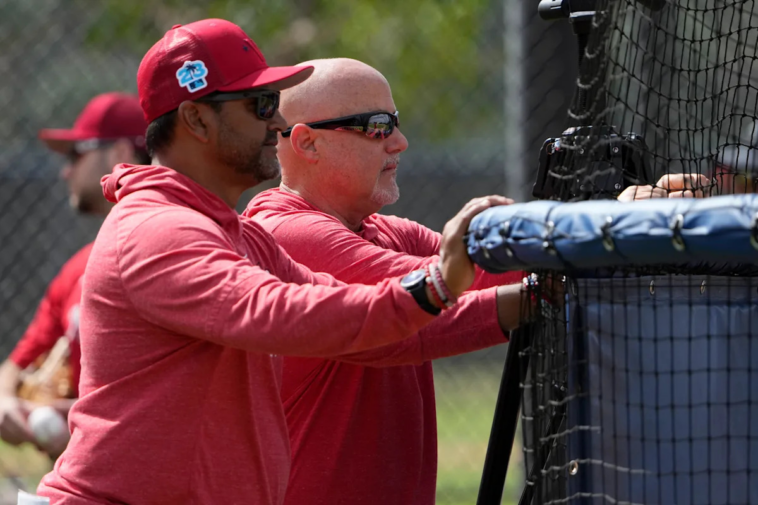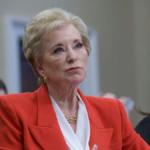Mike Rizzo didn’t wear his 2019 World Series ring on a regular basis. He didn’t need to.
The shine from that Nationals’ championship, the only one in franchise history, followed the now-former general manager everywhere he went. Occasionally, he would slide the 23.2-carat ring on for special occasions — Opening Day, a high-profile press conference — but mostly, Rizzo’s reputation carried the day. It was as if “World Series Champion” trailed his name in invisible ink, the well-deserved accolade unspoken yet omnipresent.
Advertisement
But the glory of that Champagne-soaked October became a double-edged sword.
The job security and institutional clout that Rizzo earned in 2019 calcified into a dangerous sense of complacency. In the years since then, baseball evolved. The Nationals didn’t. That inflexibility trickled down to manager Davey Martinez, the big-league coaching staff and various other pockets of the organization. As other franchises embraced baseball’s technological arms race, Washington stayed relatively stuck in its ways. It’s no surprise, then, that in the five-and-a-half seasons since their World Series title, the Nationals have racked up the second-most losses in Major League Baseball.
On Sunday, following an embarrassing home sweep defeat to the Boston Red Sox that dropped the Nats to 37-53, change finally arrived. The team, via managing principal owner Mark Lerner, announced that Rizzo and Martinez had been relieved of their duties.
The shocking news marks the end of an era. Martinez had skippered the club since 2018. Rizzo was a team employee starting in 2006 and assumed GM responsibilities in 2009. In many ways, the Nationals — who relocated to D.C. just a year before Rizzo’s arrival — were built in his image. For years, that was a good thing. Rizzo’s eye for talent and aggressiveness in free agency led to a perennial contender. But as the game changed and Rizzo didn’t, things devolved.
Advertisement
As the team embarked on a rebuild, key pieces from the 2019 team departed via free agency. Others, such as Max Scherzer, Trea Turner and Juan Soto, were dealt away in blockbusters for a haul of prospects. Some of those young players, including James Wood, CJ Abrams and MacKenzie Gore (all of whom came via the Soto deal), have become difference-makers and franchise cornerstones.
But in the main, Rizzo failed to replenish his farm system via the draft and international market. In fact, over the past 13 years, no team has been less successful than the Nats at drafting and developing homegrown talent. Rizzo is considered a great evaluator of talent, but the on-field results, or lack thereof, speak for themselves.
[Get more Nationals news: Nats team feed]
Of course, that the Nationals are here, mired in the muck, stuck in this aimless hamster wheel of a rebuild, is not solely Rizzo’s fault. The team’s dysfunctional ownership group, the Lerner family, also deserves a large share of the blame. Since Mark Lerner assumed control from his father, Ted, the beloved self-made patriarch, in 2018, the family’s stewardship of the club has grown increasingly disjointed, distant and indecisive.
Advertisement
That was best evidenced in April 2022, when the Lerners put their franchise on the market, only for the sale process to quietly fizzle out over the ensuing year and a half. All the while, the family grew less willing to invest in the club than they were during the 2010s, something that frustrated Rizzo, who felt handcuffed by what he saw as an insufficient budget. The Lerners, on the other hand, surely wanted to see the fruits of Rizzo’s rebuild before committing big money to free agents.
In the end, the family’s lack of oversight, it seems, let Rizzo’s reign deteriorate, unmonitored, past its expiration date.
Meanwhile, in the dugout, Martinez struck an even more obstinate figure. His traditionalism worked wonders with the veteran 2019 team, but it failed to translate once Washington’s roster became younger and less experienced.
Advertisement
After Abrams, Washington’s star shortstop. admired a homer at Yankee Stadium in August 2023, Martinez pulled him aside in the dugout and told the youngster to tone down the showboating. The moment felt somewhat symbolic, an old-school skipper clinging too tightly to a bygone era, trying and failing, in an overtly public setting, to instill a sense of stuffy decorum in a game that has long since embraced individuality.
Earlier this season, Martinez entangled himself in a self-inflicted kerfuffle that might become the lasting image of his downfall. When the skipper was asked how much responsibility for his team’s struggles lay with the coaching staff, Martinez was unapologetic, choosing to strike an adversarial tone.
“It’s never on coaching,” he said. “Coaches work their asses off every single day. We’re not going to finger-point here and say it’s coaches. It’s never on the coaches.”
The implication — that his underlings were infallible and the failures rested entirely with the players — ruffled feathers inside a clubhouse already frustrated with the lack of actionable insight available at the big-league level. Despite a disastrous 71-91 2024 season, no changes were made to a coaching staff that, in some areas, was considered outdated and unqualified to succeed in the modern game. In some instances, according to multiple sources, players began to intentionally tune out instruction from certain coaches altogether.
Advertisement
On Monday, bench coach Miguel Cairo was named interim manager in Martinez’s place. Whether the Nats will make any other changes to their big-league staff was unclear as of Monday afternoon.
The timing of this news caught many in the baseball world off-guard. Rizzo was fired exactly one week before this year’s MLB Draft, in which Washington holds the No. 1 pick. That decision, the most consequential one this organization has had to make since the Juan Soto trade, is made all the more interesting by the lack of a consensus top prospect.
On Sunday, the team announced that Mike DeBartolo, the senior vice president and assistant general manager of baseball operations, is now the interim GM. That means DeBartolo will oversee the upcoming draft, alongside vice president of amateur scouting Danny Haas and senior director of amateur scouting Brad Ciolek, both of whom have been with the Nats since only the fall of 2023.
Advertisement
How Rizzo’s sudden departure will impact the team’s draft strategy is — and might always be — unclear. But if ownership no longer felt confident in his ability to lead, firing him before such a crucial, franchise-defining draft makes some sense. It is, at least, better than canning him after he sketches a new blueprint for the organization’s future.
That future is now in the hands of the Lerner family and, to a lesser extent, DeBartolo. He is a relative unknown, but people around the game describe him as a perfectly qualified, analytically inclined, modern baseball exec. The job in front of him — or whoever is tasked with refurbishing the Nats — is daunting. Whether he will be entrusted with the reins full-time remains to be seen.
In time, Rizzo and Martinez will likely be remembered as franchise icons, the characters who brought a World Series to D.C. for the first time since 1924. They deserve credit for all the good — the dogpiles, the celebrations, the parade, the flags that fly forever, the ring on Rizzo’s finger.
But for the Nationals to return to that stage, change was not just inevitable. It was necessary.



